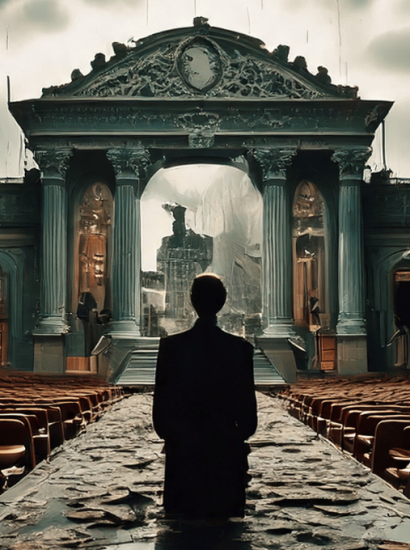This post is also available in: ΕΛΛΗΝΙΚΑ (GREEK) TÜRKÇE (TURKISH)
A decade ago, in his eulogy to Glafcos Clerides, Nicos Anastasiades thanked his “political father” for having taught him “that political ethos is not served by petty motives” and pledged to continue his struggles and live up to his expectations. “There are politicians who seek the hospitality of History and there are those who are sought out by History,” he was pointing out. “And Glafcos Clerides” – he explained – “was sought out”, placing him “in the company of the great leaders of Cyprus.” It was therefore impossible for someone to not be reminded of that moment when reading Nicos Anastasiades’ interview in Phileleftheros. Not simply because he once again seemed to project a false reality: He indicated that he felt the need to remain active for the sake of his country, that he was puzzled by what exactly it is that he is being accused of, and announced that he would lead the effort to heal the wounds affecting DISY [Democratic Rally], which he himself had brought to the brink of disintegration through his actions. But due to his reference to the “Clerides school of thought” and his implicit attempt to present himself as the successor of Glafcos Clerides, he inevitably prompted a comparison of the two men.
But how does his administration relate to that of Glafcos Clerides? Clerides had led efforts to secure a realistic compromise since ’74 and, despite occasional instances of populism, remained committed to the solution effort for as long as he was in power. He never walked out of talks, despite having Denktash and not Akinci before him, and he never talked about two states. And when the circumstances were right, taking advantage of the momentum of Turkey’s turn towards Europe, he brought the country into the EU and tabled the first comprehensive solution plan, which Tassos Papadopoulos then took it upon himself to dismantle. He never used the people as a shield to perpetuate division, he never spoke of “supporters of any solution”. During his ten years at the helm of the country, Nicos Anastasiades, unlike his “political father”, had demonstrated his readiness to engage in a direct confrontation with the EU over passports and led every effort aimed at preserving the status quo. He ‘shared out’ the country’s EEZ, he raised the issue of functionality in a way that conflicted with UN resolutions themselves, and when the momentum was there, at Crans-Montana, he walked away. Through his rhetoric and actions, he made sure to demolish any prospect [of a solution], widening the division within society and questioning the very basis of a solution in a way that no other President has done. It is no coincidence that those who stood against Tassos in 2004, stood against him. And those who stood against Glafcos Clerides over the years have been on his side.
How did the Anastasiades decade relate to that of Clerides in terms of corruption? Under Clerides, there were obviously instances of corruption. But these were not of an institutional nature. Glafcos Clerides did not himself lead the effort to stretch legislation in order to serve specific interest groups. Nor did he open and maintain windows [of opportunity] for himself and his close family circle to exploit. And no Archbishop told Glafcos Clerides that “we should stop stealing”. Under Anastasiades, the country became a den of crooks and found itself at the centre of world news. His name was included in the Pandora Papers and he became the first President to be mentioned by name in a European Parliament resolution on corruption.
What did the two men have in common in terms of their understanding of issues relating to democracy and the rule of law? Glafcos Clerides did not test the limits of the Constitution. Nor did he normalise impunity. He did not try to manipulate the people or independent institutions. He did not have people like Victor Papadopoulos making the rounds of the media or contacting journalists to do his dirty work for him. And he didn’t divide DISY. When he retired from politics, he did not open a political office, nor did he take initiatives to supposedly unite the party by trying to impose his own agenda on the new leadership so as to safeguard his reach and legacy. He left the party he founded, allowing the new leadership under Nicos Anastasiades to find its bearings, without interfering.
It is for this reason that the only one who is put in a difficult position by his references to the founder of the party and his attempt to identify with him, is [Anastasiades] himself. Because as President of the country, Nicos Anastasiades did not act as a political descendant of Glafcos Clerides but as a continuer of the politics of Tassos Papadopoulos. He did not continue the legacies of Clerides but those of the supporters of partition. That is why History will not seek him out. If he ever encounters it, it will be in order to remind future generations where a politician who serves “petty motives” can lead a country. And it will rank him as one of the greatest political opponents of Glafcos Clerides and the idea he served. As the man who brought the party to the brink of disintegration and determined the course of the Cyprus problem in a way that Tassos Papadopoulos had sought to do so. Unworthy with regard to the party. Unworthy with regard to History. Most of all, however, unworthy with regard to the country itself.
Source: ANASTASIADES: GLAFCOS CLERIDES’ GREATEST POLITICAL OPPONENT






